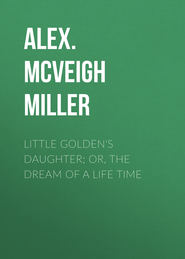По всем вопросам обращайтесь на: info@litportal.ru
(©) 2003-2024.
✖
Lancaster's Choice
Автор
Год написания книги
2018
Настройки чтения
Размер шрифта
Высота строк
Поля
"But Dick wished me to go," perplexedly; "and how is she to come if I do not go?"
"She may come with Lord Lancaster the first of June. I dare say he can go and get her all right."
"But it seems as if I ought to go myself. Besides, Lord Lancaster mightn't like it, indeed," whimpered poor Mrs. West.
"Fiddlesticks! I do not care whether he likes it or not," declared the octogenarian, snapping her fingers. "He shall do as I bid him. Aren't you willing to trust the brat with him?"
"Oh, yes, my lady," declared the housekeeper, with a sigh of relief.
CHAPTER V
"I'll be shot!" ejaculated Captain Lancaster, in a voice of the liveliest exasperation.
"Oh, no; what have you done?" exclaimed his chum, lifting his handsome head from his lounge amid a cloud of curling, blue cigar-smoke.
"Nothing; I never did anything in my life," in an injured tone, "and I am fain to ask why I am so bitterly persecuted."
"Persecuted?" inquired De Vere, languidly.
"Oh, yes, you can afford to be cool. You are the legal heir to ten thousand a year. You are not at the beck and call of a relative who gives you the most troublesome commissions to execute without so much as saying 'by your leave,'" growled Lancaster.
The young lieutenant laughed lazily.
"You have had a letter from my lady?" he said.
"Yes. Look here, De Vere, I wonder if she thinks I belong to her wholly? Must one be a white slave for the sake of coming into twenty thousand a year?"
"It is worth lots of toadying," declared De Vere, emphatically.
"I used to like Aunt Lydia—rather—before my uncle died," said Lancaster, reflectively. "She was always tart and waspish. I didn't care for it when I didn't have to bear the brunt of it. She rather amused me then, but now I get out of patience with her whims and exactions."
"What is it she wants now?" asked Harry De Vere, lazily.
"It is something I have to carry home to her from New York. By Jove! I have a great mind to refuse. Anything in reason I would willingly undertake; but, ah, really, this is too bad!" groaned the victim, dropping his head back among the cushions of his chair.
It was a handsome head, crowned with short, crisp masses of fair hair, and he was a blue-eyed young giant with the perfect features of an Antinous, and a smile that dazzled one when it played around the full red lips half veiled by the drooping ends of the long, fair mustache. He had an indolent air that was not unbecoming to him, but rather taking than otherwise. He did not look like a man who would overexert himself for anything, and yet the air might have been cultivated and not natural.
"I did not know that there was anything on this side of the 'herring-pond' her ladyship would deign to accept," said De Vere.
"There isn't. She has a horror of everything American."
"Then why—what?" inquired the other, perplexedly, and Captain Lancaster's moody brow cleared a moment, and he laughed merrily at his friend's amazed air.
"Give it up, Harry. You couldn't guess in a month," he said.
"I give it up," resignedly.
"It's a female," said Lancaster, lifting his head to note the effect on his inferior officer.
It was startling. The hands that were clasped behind the lieutenant's head relaxed suddenly, and he sat bolt upright on his sofa, his brown eyes distended to their greatest size, his whole air indicative of the greatest astonishment.
"By George! You don't say so?" he ejaculated.
Lancaster relaxed from his perturbation to laugh at his startled hearer. "It's astonishing what an effect the mere mention of the female sex has upon you, De Vere," he observed.
"Well, you did take my breath away. I confess myself astonished. Who is the female, Lancaster? Not," catching his breath excitedly, "the chosen fair?—the fatal she who is to out-captain the captain himself, and lead him captive to the hymeneal altar?"
"Pshaw!" disgustedly, "how you run on! Of course it is nothing of the sort. Could one come out of New York that would please my august aunt?"
"'Can any good come out of Nazareth?'" quoted the lieutenant, lightly. "But I say, Lancaster, you have excited my curiosity to the highest pitch. Who is the female? Am I to be associated with you in the care of her?"
"I will hand over to you the whole charge, if you wish," said the captain, with the same disgusted air.
"Cela dépend. Is she young and fair? I have found New York girls rather fascinating, usually," said De Vere, recalling sundry flirtations by the light of a chandelier, with nobody very near.
"Young? yes—very young, I should say," growled the captain, sardonically. "But not to keep you any longer in suspense, listen to this portion of my dear aunt's epistle:
"'There is a small commission I wish you to execute for me, Clive. My housekeeper's brother has died in New York and left her a little girl to take care of. I can not spare Mrs. West long enough for her to go after the child; and, in fact, I don't think it would be safe for her to go, anyhow. She is so simple, poor woman, she would be quite lost in the wilderness of New York, and might be devoured by the bulls and bears that I hear infest the place. So I want you to bring the child to England with you. I dare say she will not be much trouble. I inclose a card with her name and New York address. You are to go there and get little Leo and bring her to her aunt. Now, do not upon any account forget the child, Clive, for West would be ready to die of chagrin if you did not bring the little brat to her the first of June.'"
He paused and looked at his friend in comical anger.
"Did you ever hear of anything so deucedly cool in your life?" he said.
"No, I never did. It is most outrageous. What shall you do?"
"Advise me, please. Shall I rebel against my tormentor's mandate and refuse point-blank?"
"No, never. Rather meet the peril boldly and vanquish it. Walk boldly up to the cannon's mouth. In other words, accept the small commission."
"Small commission, indeed!" groaned the wretched victim. "What shall I do with a child—a girl-child, too—perhaps a baby?"
"That would be the best of all. You need have no trouble then. Only provide a nurse, a sucking-bottle, and some cans of condensed milk, put them aboard with the baby, and all your trouble is over," suggested the lieutenant.
"Is it so easy as that? Well, perhaps it is a baby. She calls it a girl, a little child. Yes, I have no doubt it is a baby. Well, when we leave Boston we will go over to New York and see about the nurse and the bottles," sighed Lancaster.
CHAPTER VI
Captain Lancaster and his friend, having brought letters of introduction from England, were having rather a nice time in the cultured and æsthetic circles of Boston. They had made the grand tour of the States, lingering at the last in the beautiful city where they had made some very pleasant acquaintances, and where, as eligibles of the first water, they were fêted and courted in the most flattering manner by the fashionable people of the place. It is true that Lieutenant De Vere sometimes declared that he found New York more charming, but still he lingered, loath to go, and it was two weeks after the reception of Lady Lancaster's letter before they turned their faces toward the city that held the child that was to go to England with them—the baby, as they had quite decided in their own minds it must be.
There are a few people who, when they have a disagreeable task to perform, go bravely forward and get it over. There are a great many more who shirk such things and put them off till the last moment. Captain Lancaster belonged to the latter class. He was intensely afraid of disagreeables. He revolted exceedingly from the idea of "that squalling baby" he had to carry to England. He thought that Mrs. West should come after it herself. Yet Captain Lancaster was not a bad and selfish man, as one might have supposed from his reluctance to do this kindness. The whole gist of the matter lay in the fact that his aunt had so cavalierly ordered him to do it. He chafed beneath the plainly visible fact that she meant to lead him by the nose as long as she lived, in virtue of the money she was going to leave him when she died.
So our hero mentally kicked against taking home the orphan child, and all unconsciously to himself directed a part of his vexation at his aunt against the little one. The mention of it was exceedingly distasteful to him, and when Lieutenant De Vere once or twice represented to him that he "ought to go and see about Leonora West before the last day," he invariably replied: "My dear friend, it is one of my rules never to do anything to-day that I can put off until to-morrow."
So it was actually the day before they sailed when Lancaster hunted up the address and went to look after his charge, his "small commission," as Lady Lancaster had blandly termed it. He went alone, for when De Vere offered to accompany him he shook his head and replied, decidedly, "No, I will not trouble you, for I can get over disagreeable things best alone."
So he went alone, and the address took him to a quiet, genteel boarding-house, in a quiet but highly respectable street. He rang the bell impatiently, and a smart female servant opened the door, smiling and bridling at the sight of the big, handsome young aristocrat.
"I have called to see about little Miss West. Is she here?" he inquired.
"She may come with Lord Lancaster the first of June. I dare say he can go and get her all right."
"But it seems as if I ought to go myself. Besides, Lord Lancaster mightn't like it, indeed," whimpered poor Mrs. West.
"Fiddlesticks! I do not care whether he likes it or not," declared the octogenarian, snapping her fingers. "He shall do as I bid him. Aren't you willing to trust the brat with him?"
"Oh, yes, my lady," declared the housekeeper, with a sigh of relief.
CHAPTER V
"I'll be shot!" ejaculated Captain Lancaster, in a voice of the liveliest exasperation.
"Oh, no; what have you done?" exclaimed his chum, lifting his handsome head from his lounge amid a cloud of curling, blue cigar-smoke.
"Nothing; I never did anything in my life," in an injured tone, "and I am fain to ask why I am so bitterly persecuted."
"Persecuted?" inquired De Vere, languidly.
"Oh, yes, you can afford to be cool. You are the legal heir to ten thousand a year. You are not at the beck and call of a relative who gives you the most troublesome commissions to execute without so much as saying 'by your leave,'" growled Lancaster.
The young lieutenant laughed lazily.
"You have had a letter from my lady?" he said.
"Yes. Look here, De Vere, I wonder if she thinks I belong to her wholly? Must one be a white slave for the sake of coming into twenty thousand a year?"
"It is worth lots of toadying," declared De Vere, emphatically.
"I used to like Aunt Lydia—rather—before my uncle died," said Lancaster, reflectively. "She was always tart and waspish. I didn't care for it when I didn't have to bear the brunt of it. She rather amused me then, but now I get out of patience with her whims and exactions."
"What is it she wants now?" asked Harry De Vere, lazily.
"It is something I have to carry home to her from New York. By Jove! I have a great mind to refuse. Anything in reason I would willingly undertake; but, ah, really, this is too bad!" groaned the victim, dropping his head back among the cushions of his chair.
It was a handsome head, crowned with short, crisp masses of fair hair, and he was a blue-eyed young giant with the perfect features of an Antinous, and a smile that dazzled one when it played around the full red lips half veiled by the drooping ends of the long, fair mustache. He had an indolent air that was not unbecoming to him, but rather taking than otherwise. He did not look like a man who would overexert himself for anything, and yet the air might have been cultivated and not natural.
"I did not know that there was anything on this side of the 'herring-pond' her ladyship would deign to accept," said De Vere.
"There isn't. She has a horror of everything American."
"Then why—what?" inquired the other, perplexedly, and Captain Lancaster's moody brow cleared a moment, and he laughed merrily at his friend's amazed air.
"Give it up, Harry. You couldn't guess in a month," he said.
"I give it up," resignedly.
"It's a female," said Lancaster, lifting his head to note the effect on his inferior officer.
It was startling. The hands that were clasped behind the lieutenant's head relaxed suddenly, and he sat bolt upright on his sofa, his brown eyes distended to their greatest size, his whole air indicative of the greatest astonishment.
"By George! You don't say so?" he ejaculated.
Lancaster relaxed from his perturbation to laugh at his startled hearer. "It's astonishing what an effect the mere mention of the female sex has upon you, De Vere," he observed.
"Well, you did take my breath away. I confess myself astonished. Who is the female, Lancaster? Not," catching his breath excitedly, "the chosen fair?—the fatal she who is to out-captain the captain himself, and lead him captive to the hymeneal altar?"
"Pshaw!" disgustedly, "how you run on! Of course it is nothing of the sort. Could one come out of New York that would please my august aunt?"
"'Can any good come out of Nazareth?'" quoted the lieutenant, lightly. "But I say, Lancaster, you have excited my curiosity to the highest pitch. Who is the female? Am I to be associated with you in the care of her?"
"I will hand over to you the whole charge, if you wish," said the captain, with the same disgusted air.
"Cela dépend. Is she young and fair? I have found New York girls rather fascinating, usually," said De Vere, recalling sundry flirtations by the light of a chandelier, with nobody very near.
"Young? yes—very young, I should say," growled the captain, sardonically. "But not to keep you any longer in suspense, listen to this portion of my dear aunt's epistle:
"'There is a small commission I wish you to execute for me, Clive. My housekeeper's brother has died in New York and left her a little girl to take care of. I can not spare Mrs. West long enough for her to go after the child; and, in fact, I don't think it would be safe for her to go, anyhow. She is so simple, poor woman, she would be quite lost in the wilderness of New York, and might be devoured by the bulls and bears that I hear infest the place. So I want you to bring the child to England with you. I dare say she will not be much trouble. I inclose a card with her name and New York address. You are to go there and get little Leo and bring her to her aunt. Now, do not upon any account forget the child, Clive, for West would be ready to die of chagrin if you did not bring the little brat to her the first of June.'"
He paused and looked at his friend in comical anger.
"Did you ever hear of anything so deucedly cool in your life?" he said.
"No, I never did. It is most outrageous. What shall you do?"
"Advise me, please. Shall I rebel against my tormentor's mandate and refuse point-blank?"
"No, never. Rather meet the peril boldly and vanquish it. Walk boldly up to the cannon's mouth. In other words, accept the small commission."
"Small commission, indeed!" groaned the wretched victim. "What shall I do with a child—a girl-child, too—perhaps a baby?"
"That would be the best of all. You need have no trouble then. Only provide a nurse, a sucking-bottle, and some cans of condensed milk, put them aboard with the baby, and all your trouble is over," suggested the lieutenant.
"Is it so easy as that? Well, perhaps it is a baby. She calls it a girl, a little child. Yes, I have no doubt it is a baby. Well, when we leave Boston we will go over to New York and see about the nurse and the bottles," sighed Lancaster.
CHAPTER VI
Captain Lancaster and his friend, having brought letters of introduction from England, were having rather a nice time in the cultured and æsthetic circles of Boston. They had made the grand tour of the States, lingering at the last in the beautiful city where they had made some very pleasant acquaintances, and where, as eligibles of the first water, they were fêted and courted in the most flattering manner by the fashionable people of the place. It is true that Lieutenant De Vere sometimes declared that he found New York more charming, but still he lingered, loath to go, and it was two weeks after the reception of Lady Lancaster's letter before they turned their faces toward the city that held the child that was to go to England with them—the baby, as they had quite decided in their own minds it must be.
There are a few people who, when they have a disagreeable task to perform, go bravely forward and get it over. There are a great many more who shirk such things and put them off till the last moment. Captain Lancaster belonged to the latter class. He was intensely afraid of disagreeables. He revolted exceedingly from the idea of "that squalling baby" he had to carry to England. He thought that Mrs. West should come after it herself. Yet Captain Lancaster was not a bad and selfish man, as one might have supposed from his reluctance to do this kindness. The whole gist of the matter lay in the fact that his aunt had so cavalierly ordered him to do it. He chafed beneath the plainly visible fact that she meant to lead him by the nose as long as she lived, in virtue of the money she was going to leave him when she died.
So our hero mentally kicked against taking home the orphan child, and all unconsciously to himself directed a part of his vexation at his aunt against the little one. The mention of it was exceedingly distasteful to him, and when Lieutenant De Vere once or twice represented to him that he "ought to go and see about Leonora West before the last day," he invariably replied: "My dear friend, it is one of my rules never to do anything to-day that I can put off until to-morrow."
So it was actually the day before they sailed when Lancaster hunted up the address and went to look after his charge, his "small commission," as Lady Lancaster had blandly termed it. He went alone, for when De Vere offered to accompany him he shook his head and replied, decidedly, "No, I will not trouble you, for I can get over disagreeable things best alone."
So he went alone, and the address took him to a quiet, genteel boarding-house, in a quiet but highly respectable street. He rang the bell impatiently, and a smart female servant opened the door, smiling and bridling at the sight of the big, handsome young aristocrat.
"I have called to see about little Miss West. Is she here?" he inquired.











